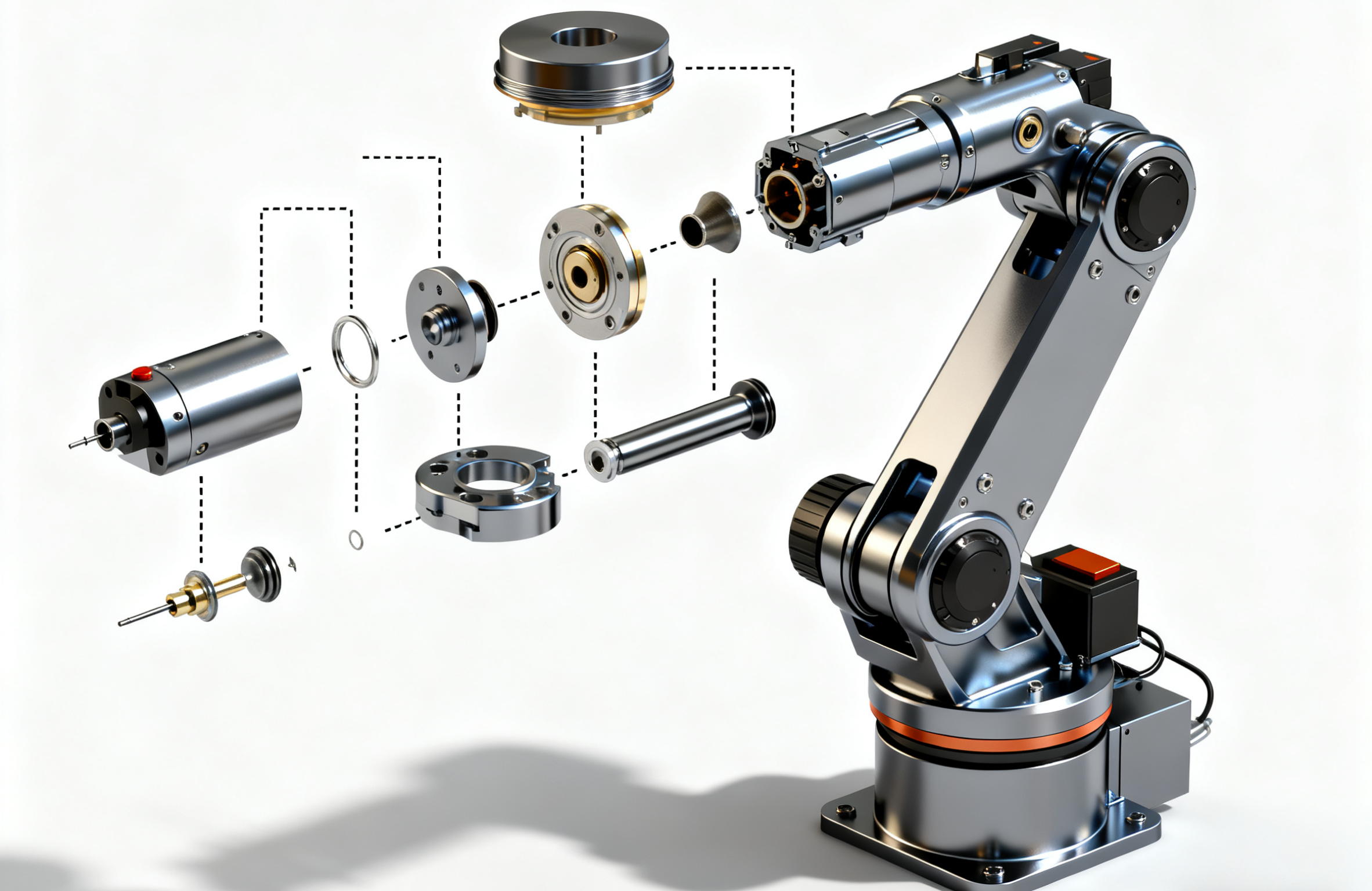
As global manufacturing enters a new phase of intense competition, the components industry—an essential link in the industrial supply chain—is under unprecedented pressure.
Customer demands are becoming increasingly personalized, delivery cycles are getting shorter, and traditional methods such as manual pricing, manual DFM evaluation, and manually writing work instructions are not only inefficient but also highly error-prone.
Naturally, companies are beginning to ask the same question:
“Is there a way to make design and manufacturing faster, more accurate, and more stable?”
The answer is simple: Empower the components industry with AI.
From design to production, AI is permeating—and even reshaping—every stage of the process.
This article will share three key AI applications in the components sector, based on real-world industry practices:
- Quotation & Cost Analysis — reducing lead time from “days” or “weeks” to “seconds” or “minutes”
- DFM (Design for Manufacturability) Evaluation — cutting costs in half at the design stage
- Work Instruction Generation — standardizing and accelerating process knowledge transfer
These three applications not only improve efficiency but, more importantly, help companies accumulate knowledge, reduce risk, and strengthen competitiveness.

1. AI Makes Quotation & Cost Analysis Faster and More Accurate
In the traditional component business, quotation engineers rely heavily on personal experience to manually break down BOMs, calculate process steps, and repeatedly request pricing.
- A complex part quotation often takes 1–3 days to complete.
- Manual calculations are error-prone, leading to significant discrepancies—or worse, underquoting and financial loss.
How much of a difference can AI make?
- The system automatically parses 2D/3D drawings, identifying features, dimensions, tolerances, and material information.
- It auto-generates structured BOMs, integrates material and labor databases, and delivers cost analysis and quotations in as fast as 5 seconds.
- Quotation accuracy is controlled within 2%–5%, improving efficiency by 99%.
For sales and procurement teams, AI means:
- Faster access to reliable cost data, strengthening negotiation power.
- Rapid comparison of multiple design solutions to support smarter R&D decisions.
On the Leanplans AI cloud platform, we’ve achieved component quotations in under 60 seconds, cutting a two-hour workflow down to just one minute. For teams that quote frequently, this is a game changer.
2. AI-Driven DFM: Preventing Rework at the Design Stage
Many manufacturability problems aren’t obvious during part design, such as:
- Walls that are too thin, making machining difficult
- Overly tight tolerances that drive up cost unnecessarily
- Poor internal cavity design that requires special tools or is impossible to machine
These issues are often discovered during prototyping or even mass production, making rework extremely costly. That’s why DFM (Design for Manufacturability) is critical.
But traditional DFM has its problems:
- Highly dependent on experienced process engineers, making it subjective
- Requires cross-departmental meetings, leading to long cycles
- Coverage is incomplete, increasing the chance of hidden risks
AI brings DFM into a new era:
- Automatically scans 2D/3D models to identify sharp edges, thin walls, deep holes, and tolerance risks
- Provides modification suggestions and generates standardized evaluation reports at the design stage
- Continuously learns and optimizes with enterprise process databases, building a knowledge base over time
This enables:
- Early detection and resolution of 80%+ of potential manufacturing issues
- Designs that are more production-friendly, significantly reducing rework rates
- 30%–50% average cost savings
With Leanplans AI agents, a “DFM Evaluation Report” can be generated in just 120 seconds, replacing what previously required two lengthy review meetings. This saves valuable time and significantly enhances collaboration between R&D and manufacturing teams.
3. AI-Generated Work Instructions: Intelligent Process Knowledge Transfer
If quotation and DFM are critical to the R&D phase, then Standard Operating Procedures (SOPs) or process cards are the “execution standards” on the production floor.
Traditional pain points:
- A process engineer needs 1–2 hours to manually create an SOP.
- The content involves repetitive work and lacks standardization.
- Document formats vary from person to person, making them hard for new employees to understand.
- Updates are not timely, leading to outdated documents on the shop floor.
This inefficiency also brings quality and safety risks.
How AI generates SOPs:
- Engineers simply highlight machining features on the design model.
- AI automatically generates process text descriptions, operation diagrams, key notes, and quality checkpoints.
- The document includes step-by-step instructions, process diagrams, tool lists, and safety notes.
- It supports PDF and web formats, ready to use in workshops.
Results:
- Documentation efficiency improves by 80%+
- Unified format and clear logic eliminate human inconsistency
- Process expertise becomes part of the company’s knowledge base rather than remaining personal experience
On the Leanplans AI cloud platform, an SOP that previously required 1.5 hours of manual work can now be generated in 60 seconds. This allows engineers to focus on process optimization and innovation instead of repetitive documentation.
4. The Overall Value of AI: Lower Cost, Higher Efficiency, Better Quality
Across these three application scenarios, the value of AI in the components industry is clear:
Cost Reduction
- Less rework, fewer unnecessary high-precision operations, higher yields
Efficiency Gains
- Quotation cycle: from days to minutes
- DFM evaluation: from weeks to minutes
- SOP generation: from 1.5 hours to 1 minute
Quality Improvement
- Standardized documentation minimizes deviations
- Early detection of design issues reduces scrap rates
- Improved machine utilization and production safety
More importantly, AI is not just a tool—it’s like having a continuously learning and evolving “expert team.”
It enables companies to shift from experience-driven to data-driven operations, paving the way for true digital and intelligent transformation.
5. Leanplans in Action
The Leanplans AI Cloud Platform is built on industry-leading multimodal large models.
It is not a single tool but a full suite of intelligent agents covering quotation, DFM, process documentation, and CNC programming — designed to reshape enterprise workflows.
- Quotation Agent: Completes cost analysis in seconds, improving pricing speed and accuracy.
- DFM Agent: Automatically identifies design issues and generates evaluation reports with recommendations.
- Process Documentation Agent: Generates SOPs instantly, standardizing knowledge transfer.
- CNC Programming Agent: Parses 3D models and generates collision-free CNC code.
Today, Leanplans is already supporting industries such as robotics, UAVs, precision manufacturing, and academic research, helping clients achieve breakthroughs in efficiency, cost control, and quality stability.
6. Conclusion
The components industry is undergoing a profound transformation.AI is no longer a distant vision — it’s already here.
The intelligentization of DFM evaluation, quotation, and SOP generation is reshaping how companies operate. Those who embrace AI first will hold the advantage in tomorrow’s market.
At Leanplans, we believe:
- Design = Process
- Manufacturing = Intelligence
- Service = Value
And AI is the core engine driving this transformation forward.
If you’re exploring ways to shorten R&D cycles, minimize design risks, or reduce production costs—Leanplans’ AI-powered DFM and Cloud Manufacturing solutions are here to help.
📩 Contact Us Today
At Leanplans, we help manufacturers create configurable AI agents that understand your processes, your materials, and your goals.

